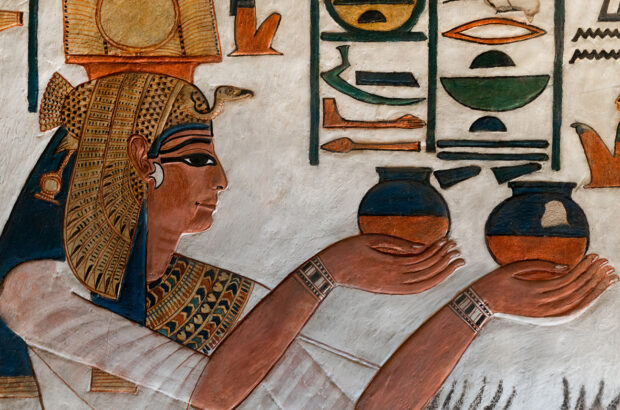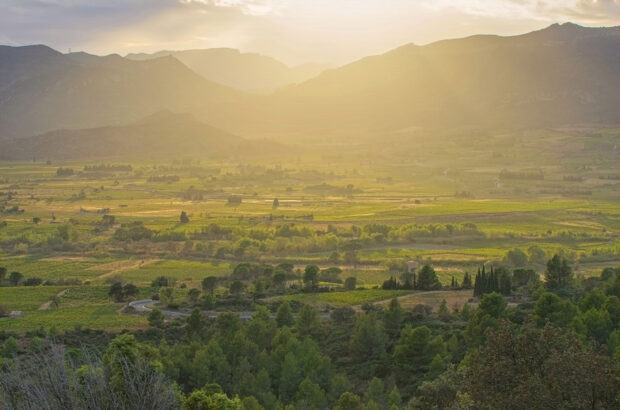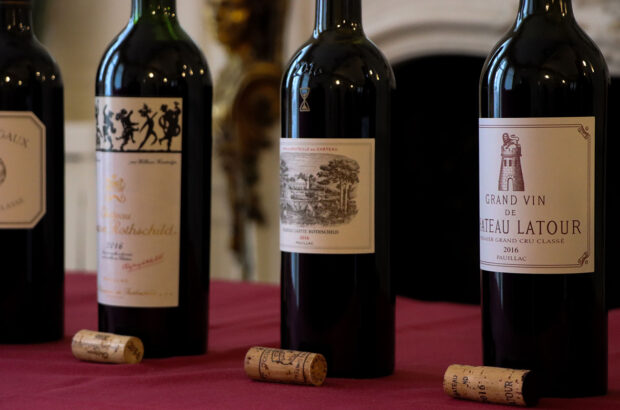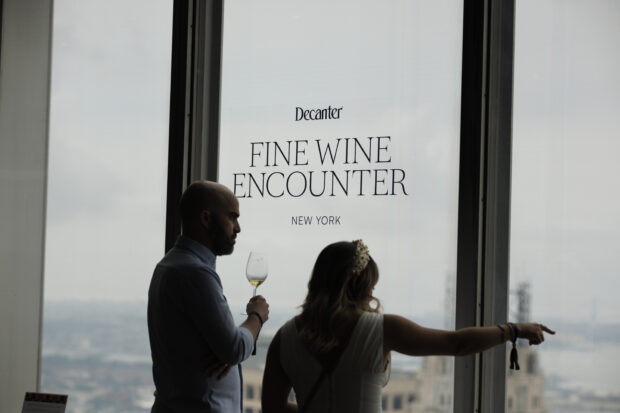Over the past two decades, DO Utiel-Requena has been developing and consolidating a unique sustainability action plan that addresses the environmental, social and economic impact of the region’s wine industry. The plan sits at the heart of an encompassing strategic approach that considers the past and future in tandem. New emphasis is being given to the preservation of the region’s heritage, history and natural resources, while also promoting community engagement and innovation.
By giving equal weight to all aspects of sustainable development, Utiel-Requena’s strategy stands out as an example of creativity, coordination and multidisciplinarity, defining a new benchmark for wine regions the world over.
A philosophy of collaboration
Integral to DO Utiel-Requena’s philosophy – and to the success of its plan – is the summoning of different stakeholders to become part of a shared vision for the region’s future. Winemakers, growers, local councils, schools and hospitality venues form a diverse and vibrant constellation of collaborative agents, with the DO’s Consejo Regulador at its epicentre, who benefit from and contribute to this holistic approach.
Partnerships between all or some of these agents target specific intervention areas; for example Asociación Territorio Bobal advocates for the preservation of the region’s flagship variety, and Ruta del Vino de la DO Utiel-Requena promotes wine tourism in the area.
The involvement of local education institutions, linking students with those who work the land, is particularly of note. The DO runs a pedagogical programme with five secondary schools, as well as the Viticulture and Winemaking School of Requena and the Hospitality School of Utiel. The fruits of the project range from the production of limited-edition wines to inspiring collections of stories and poems, written by students after interviewing growers and winemakers.

Local schools take part in wine harvest
Preserving the roots
At the heart of it all are, of course, the vineyards of Utiel-Requena and its unique viticultural heritage. The preservation of the region’s invaluable stock of old vineyards and the genetic diversity of local varieties has been a priority for many years. These assets are fundamental to produce quality wines that have a sense of place and essential tools to face the challenges of climate change.
Highly adapted to local conditions and terroir, local grape varieties – among which the flagship red Bobal and the underestimated white Tardana stand out – have the incredible ability to leverage local conditions (altitude, significant temperature amplitudes) to preserve freshness and acidity, while delivering aromatic and textural complexity. Promoting biodiversity and safeguarding the region’s wealth of indigenous flora and fauna are two other key areas of focus. Thus, expertise is offered to support growers and producers to implement organic and regenerative farming practices.

People at the centre
The protection of these natural assets would not be possible, however, without a parallel fight against depopulation. As such, environmental sustainability is inextricably linked to social and economic variables, justifying the holistic, connected strategy developed by DO Utiel-Requena. Further to the work with educational institutions – which will hopefully motivate younger generations to pursue careers in the local wine industry – the Consejo works closely with restaurants and hotels, empowering staff with knowledge of the region’s wines and history. It also participates actively in multiple gastronomic events and local festivities – all documented in the Agenda del Vino produced by the Consejo itself – highlighting the importance of viticulture and winemaking for the region’s identity and economic resilience.
Utiel-Requena’s approach to sustainability, in all its facets, is above all founded upon a sense of hope, joy and fierce determination. It is shaped by a deep belief in the uniqueness of the region’s terroirs and grapes, the talent and passion of its people, and the outstanding potential (viticultural as well as commercial) of its wines. It therefore highlights how the sustainability of the local wine industry and its community is in fact at the heart of the future of the region as whole.

14 Flagship DO Utiel-Requena producers discuss their individual approach to sustainability

Chozas Carrascal
Founded by husband and wife Julián López and María José Peidro and having celebrated its 20th harvest in 2023, Chozas Carrascal has become one of Utiel-Requena’s most proactive and renowned producers. Recognising the intrinsic value of the estate’s terroir – a gently rolling slope, at an altitude between 750 and 840 metres, in one of the appellation’s coolest areas – and of the existing plots of old, bush-trained vines, the couple embarked on a path of renovation and expansion that has made Chozas Carrascal what it is today.
Read more about the story and wines of Chozas Carrascal

Grupo Coviñas
Founded in 1965, Grupo Coviñas brought together ten cooperatives from what is now DO Utiel-Requena under the umbrella of a single entity. Having started as a response to the need for shared resources and infrastructures, the project soon evolved to become one of Spain’s – and Europe’s – most respected cooperative wineries.
Read more about the story and wines of Grupo Coviñas

Vera de Estenas
In June 2023, Félix Martínez Roda invited journalists, experts and friends for a very special tasting at Vera de Estenas: a vertical of Casa Don Ángel, going back to 2018, the very first vintage of the winery’s flagship DO Utiel-Requena wine. It was a celebration not only of the wine’s character, longevity and identity but also of an ongoing commitment to the appellation and to Bobal.
Read more about the story and wines of Vera de Estenas
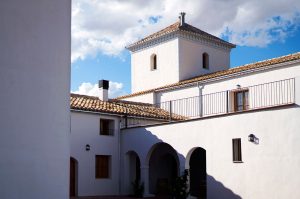
Montesanco
When María Sancho and Paco Cotino came upon a property in Utiel-Requena with an imposing, albeit almost derelict, estate manor surrounded by rolling hills and old, bush-trained Bobal vines, they knew they were being offered a challenge worth embracing. They embarked on a renovation and renewal project that combines their passion for architecture and viticulture, allowing them to revisit tradition while creating their own, contemporary interpretation of the region and its wines.
Read more about the story and wines of Montesanco
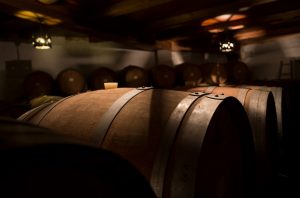
Bodegas Vibe
There’s a particular quality about wines made with their gastronomic potential in mind. A combination of aromatic depth, textural complexity and drinkability are the attributes that have defined the stylistic approach of Bodegas Vibe and that distinguish them from many of their counterparts. This is hardly surprising, given the background of the winery’s founders, a family behind multiple restaurants and catering providers in and around Valencia.
Read more about the story and wines of Bodegas Vibe
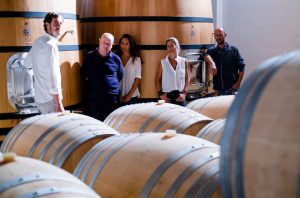
Valsangiacomo
When, in 2016, the Valsangiacomo family purchased the El Albardín vineyard in the village of San Juan de Requena, an important stage of its Bobal project had been completed. Having acquired the former local cooperative in 2010, the family was now able to produce an organic-certified wine from bush-trained vines, 60 years old on average. This highlighted the family’s efforts to recover the village’s winemaking tradition with a holistic understanding of terroir as shaped both by the vitocultural and socioeconomic identity of a place. It also cemented Valsangiacomo’s larger, encompassing sustainability strategy.
Read more about the story and wines of Valsangiacomo

Finca San Blas
At Finca San Blas, sustainability and biodiversity are not abstract goals embraced as a trend; they are the core concepts upon which the estate’s management is based. More than a commercial venture, San Blas is foremost a social and environmental enterprise whose main goal is the preservation of the 600 hectares of lands it spans across.
Read more about the story and wines of Finca San Blas
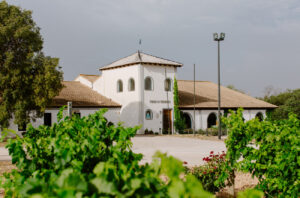
Pago de Tharsys
Surrounded by its estate-owned organic-certified vineyards, Pago de Tharsys follows a château-like approach when it comes both to its winemaking and sustainability programmes. Based on a profound sense of place indebted to tradition, the team at Pago de Tharsys uses simplicity and pragmatism to manage the estate without artifice and with optimal use of resources. Having been at the forefront of organic farming in the region – and as producers as some of the region’s most recognisable wines bearing an organic stamp – Pago de Tharsys has established itself as a reference of sustainability best-practices without frills or misleading ‘bells and whistles’.
Read more about the story and wines of Pago de Tharsys

Vegalfaro
The founding of Vegalfaro was itself a statement of social sustainability: a cross-generational winery venture from father-and-son team Andrés and Rodolfo Valiente, bringing together complementary knowledge about viticulture’s past and present, and a shared vision for its future. Rodolfo is now at the helm of the project, supported by a small, close-knit team of local employees, making Vegalfaro deeply rooted in the history, community and future of DO Utiel-Requena.
Read more about the story and wines of Vegalfaro
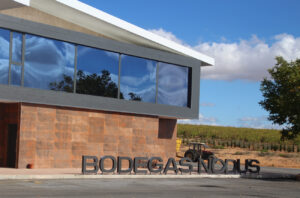
Bodegas Nodus
If the introduction of sustainable viticulture and winemaking practices is increasingly becoming the rule in the wine sector, that’s thanks to pioneering producers such as Bodegas Nodus. Having championed organic farming, governance and resource management before such concepts were even fully understood, Nodus remains at the forefront of Utiel-Requena’s collective sustainability efforts.
Read more about the story and wines of Bodegas Nodus
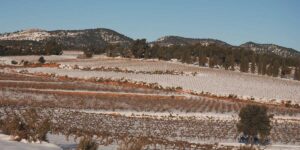
Bodegas Iranzo
In the first decade of the 20th century, when Bodegas Iranzo bottled the wines hailing from Cañada-Honda stating the origin of the grapes on the labels, the producer became the first to release an estate wine. Since then, Iranzo has remained committed to its unique legacy while consolidating a pioneering sustainability strategy in active implementation since the late 1950s.
Read more about the story and wines of Bodegas Iranzo

Sierra Norte
Attention and detail and collaboration are the foundations of Sierra Norte, a project that began with the pioneering vision of two men with a love for their land and was consolidated by their descendants with a focus on organic viticulture and indigenous grape varieties. From its humble beginnings, the company has established itself as one of the foremost projects in Utiel-Requena, championing organic farming, research and the region’s flagship grape, Bobal.
Read more about the story and wines of Sierra Norte
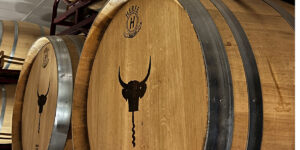
BVC Bodegas
The brainchild of Valérie Bataille and Benoit Calvet, BVC Bodegas was founded in 2014 as a sister project of the couple’s Bordeaux-based Maison BVC (Benoit and Valérie Calvet). Having started their négociant business in 1985, the entrepreneurs have since developed a comprehensive range of terroir-led wines by seeking like-minded partners in singular regions across France, Spain and Italy. In Utiel-Requena they not only found a unique landscape of incredible viticultural potential but also a community eager to embrace new projects.
Read more about the story and wines of BVC Bodegas

Neleman
‘Organic Spanish wines with a Dutch heart’ – this is how the project, founded by Dutch entrepreneur Derrick Neleman in 2014, defines itself. There is indeed an incredible sense of place in all the wines produced by the eponymous winery, while the brand’s identity is infused with creative wonder and entrepreneurial spirit – perhaps showing that it is sometimes easier for an outsider to leverage the true value of what locals might take for granted.
The founder’s belief that good wine can only be a product of a profound respect for natural resources and relentless attention to detail is at the core of Neleman’s ethos. Derrick found the ideal place to develop his vision in the region of Valencia, where his enthusiasm and can-do attitude found a pristine landscape, an incredible viticultural heritage and a welcoming community of growers.
Read more about the story and wines of Neleman
Discover more about DO Utiel-Requena
Explore the region and its flagship producers





